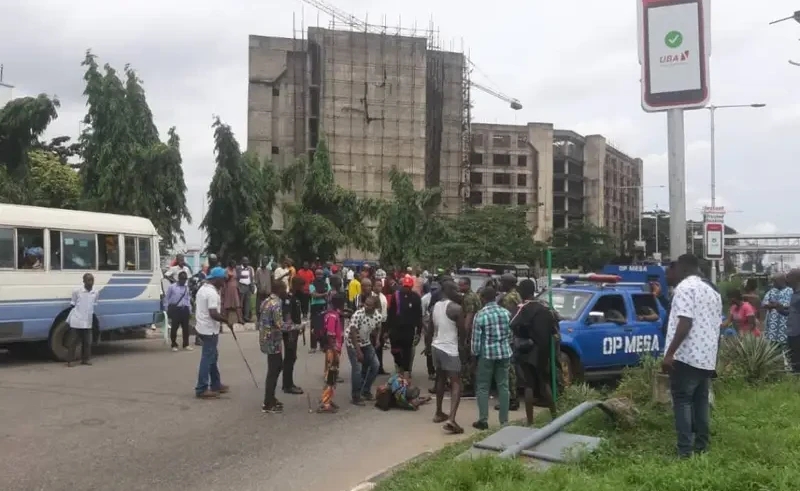Over 500 members of Nigeria’s visually-impaired community staged a protest at Lagos’s Murtala Muhammed International Airport on Monday, obstructing key access roads and demanding urgent government action to address systemic neglect of people with disabilities. Organized by the Farmcraft Center for the Blind, the demonstration caused significant disruptions, stranding travelers and prompting some to trek long distances to reach their flights amid gridlocked traffic.
Representatives from the group, including spokesperson Mr. Dolor, emphasized that the protest aimed to highlight the dire living conditions faced by Nigeria’s disabled population. Dolor explained that many blind individuals have been forced into begging due to inadequate state support, worsened by the closure of their vocational school in 2023. “The situation is unbearable. Our school, which provided skills and dignity, remains shut despite repeated appeals to authorities,” he said. “People are angry—survival should not depend on charity.”
The Farmcraft Center, once a critical institution for training blind Nigerians in crafts and agriculture, halted operations over a year ago after struggling to secure government assistance. Protesters argued that its closure has deepened poverty and exclusion, leaving graduates without livelihoods. “We’ve exhausted all avenues to revive the school, but our efforts keep failing,” Dolor added.
The Federal Airports Authority of Nigeria (FAAN) acknowledged the demonstration in a public statement, confirming that security personnel were deployed to manage traffic and ensure order. While the protest remained peaceful, its location at one of West Africa’s busiest travel hubs underscored the demonstrators’ strategy to amplify their message. Travelers reported hours-long delays, with social media footage showing crowds navigating luggage through stalled vehicles.
The incident has reignited conversations about disability rights in Nigeria, where advocates have long criticized gaps in implementing the 2018 Discrimination Against Persons with Disabilities Act. The law mandates improved access to education, healthcare, and employment, but enforcement remains inconsistent. Lagos, Nigeria’s economic hub, has seen growing advocacy efforts in recent years, though activists argue progress is too slow for communities facing daily hardship.
This protest reflects rising frustration among marginalized groups over unfulfilled government promises. As international observers monitor Nigeria’s human rights landscape, the demonstrators’ plight spotlights the urgent need for policymakers to prioritize inclusive reforms—not only to comply with legal frameworks but to address the stark realities of those living on society’s edges.
